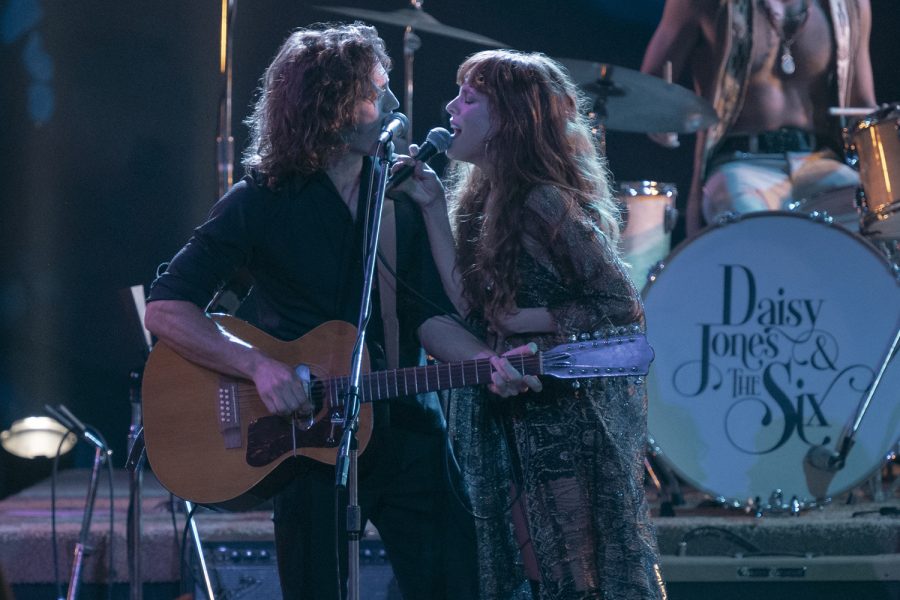‘Daisy Jones & the Six’ captures ‘70s California haze despite stars’ shortcomings
March 29, 2023
Late ‘70s rock and roll life, the ethereal Laurel Canyon and Sunset Strip, folksy shawls and endless pill-popping take full display in Amazon’s new mini-series “Daisy Jones & the Six.” The mini-series released its final episodes Friday and offers the classic convergence of drama, pop culture and music that young audiences crave, but its leading stars fall flat.
Based on the 2019 novel of the same name by Taylor Jenkins Reid, the series follows a Fleetwood Mac-inspired fictional band fueled by doomed relationships, excessive substance abuse and an all-too-familiar hunger for fame.
Riley Keough, Elvis Presley’s granddaughter, stars as Daisy in the Reese Witherspoon-produced project. While Daisy’s persistence and confidence feels manufactured and predictable, Keough nails the mannerisms of a rock star. Her co-star Sam Claflin, who plays collaborator and co-star Billy Dunne, lacks creative allure, but his drive shines through.
Notably, Suki Waterhouse portrays keyboardist Karen Sirko, perfectly encapsulating a playful, serene role behind the piano, and a relatively calm voice of reason.
The series finds its footing in the necessary business of escapism, taking audiences into the haze of yesterday, from the grandiose home of the band’s producer, full of vinyl and wood paneling, to a hippie-like Volkswagen Type 2.
Other visuals feel less refreshing. Although showrunners publicly embrace similarities to the legendary band, the wardrobe of Stevie Nicks-esque Daisy Jones appears less of a tribute and more of a copy. The visuals certainly exacerbate the parallelisms less apparent in the book. In the show’s final episode, Daisy raises her arms like wings while sporting a mystifying silver shawl, and for Fleetwood Mac fans, it almost feels impolite for her not to burst into “Rhiannon.” Still, a highlight arrives in a tense scene referencing the gripping coalescence of drugs and rock, as “Gold Dust Woman” hauntingly rings.
Still, the series’ music proves quite original and will echo for years to come. Not many mini-series can flaunt a chart-topping, companion album like Aurora, a nod to 1977’s Rumours. Crafted with the help of artists including ‘70s legend Jackson Browne and modern singer-songwriter Phoebe Bridgers, the album beautifully encapsulates the bright California folk sound, especially with standout song “Let Me Down Easy.”
Keough and Claflin nail their vocal performances, especially considering that neither had much singing experience prior to filming. The actors, cast before the pandemic, impressively spent more than a year learning and practicing their instruments for live performances before crowds of extras. Will Harrison steals the show musically as Graham Dunne, and in preparation for the role, deserves props for becoming a master guitarist along with one of the show’s most loveable characters.
After smashing streaming and music records – whether admired or agonized by critics – Amazon can proudly proclaim success. Despite its shortcomings, the show’s weaknesses may only feel most obvious to fans of the book and Fleetwood Mac groupies. To the masses, raw feelings matter more than storytelling chops. Most importantly, the series conveys ‘70s nostalgia through vulnerability and song – a perfect storm honoring a stylistic era audiences cannot seem to get enough of lately.
4 Rumours out of 5



